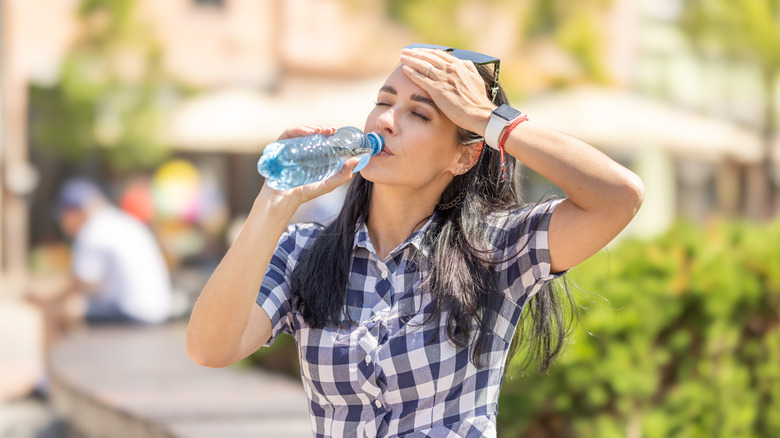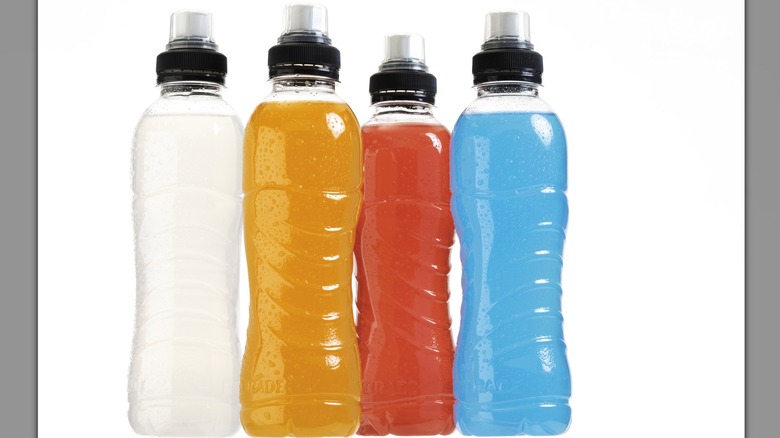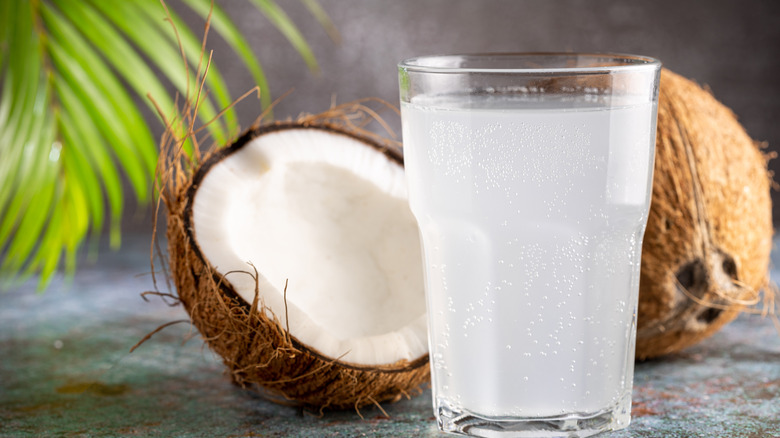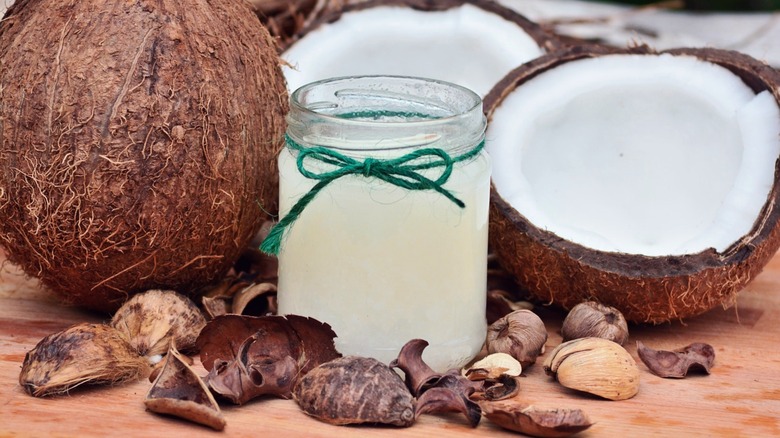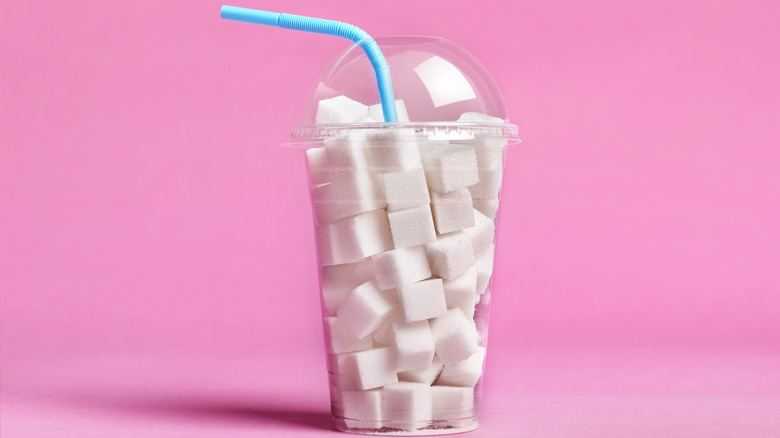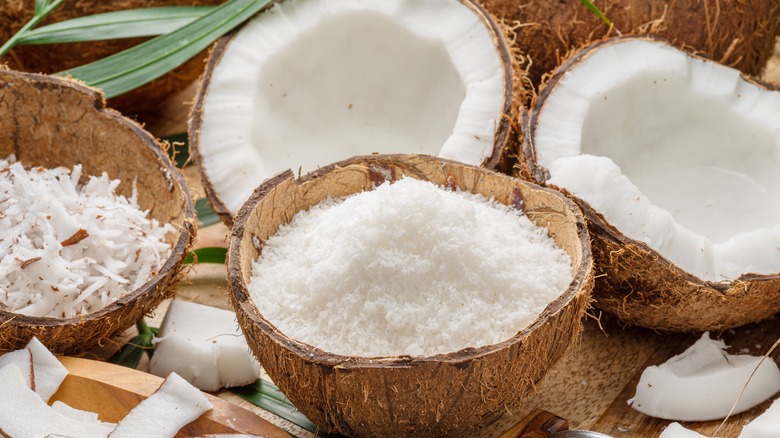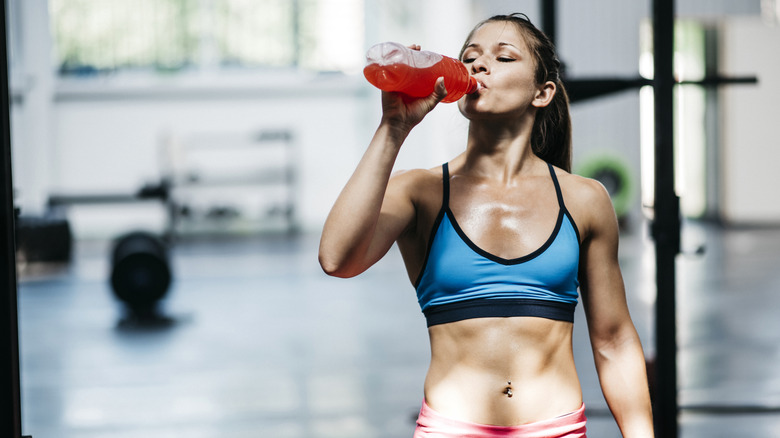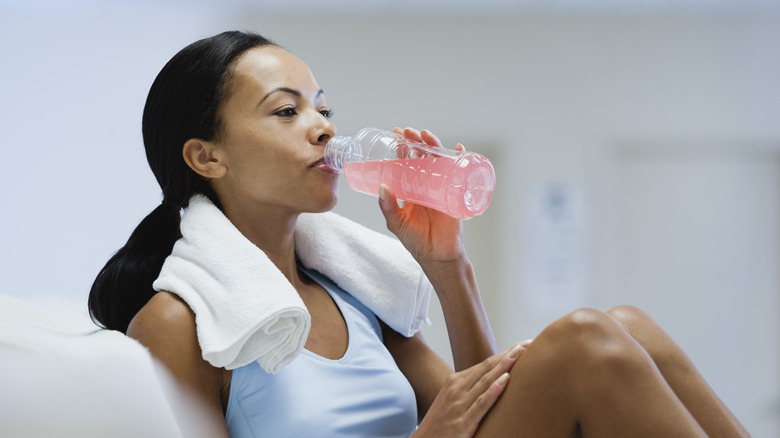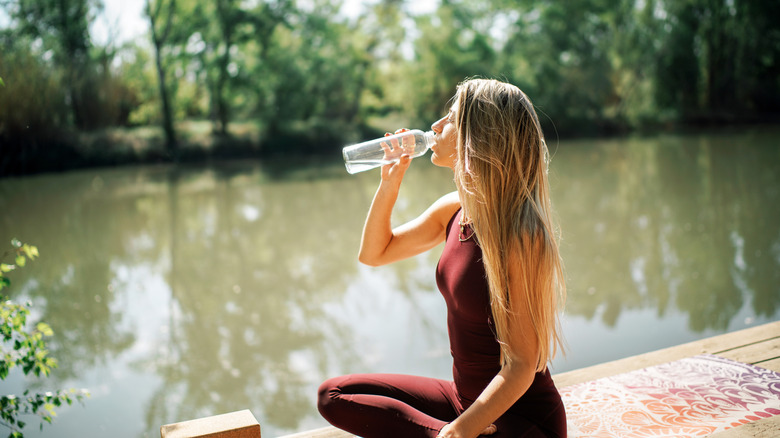Coconut Water Vs Sports Drinks: Everything You Need To Know About Staying Hydrated
Staying properly hydrated is one of the most important things you can do for your body. Whether you are an athlete or not, proper hydration is key to the proper functioning of all of the organs in your body. Many people stick with drinking water, but there are also other beverages that can help you hydrate more productively — depending on your situation.
We all have images from the Gatorade commercials forever imprinted in our minds: the unnaturally colored sweat dripping off the athletes' faces as they happily chug the sports drink. Gatorade, along with other brands like Powerade and Propel, have been popular drinks for people when performing high levels of physical activity. They've also become popular as a general thirst quencher, especially in hot climates. Coconut water is another drink that helps with hydration. More and more coconut water brands have popped up over the years, each with its own twist. It's not as mainstream as sports drinks are, but its popularity has increased immensely over the last decade. People are drawn to coconut water because it's a natural way to hydrate directly from a fruit source.
We spoke with several nutrition experts, fitness experts, and doctors and referenced reliable information online to help explain the differences between sports drinks and coconut water. Each drink has a time and a place, and we're going to tell you why.
What are sports drinks made of?
Sports drinks come in a variety of flavors and bright colors. When looking at the nutrition information for Gatorade and Powerade (two of the most popular sports drinks on the market), they have similarities in their ingredients. Both contain water, salt, and some form of sugar. They also have various artificial colors and additives such as citric acid and monopotassium phosphate.
Ultimately — sports drinks aren't natural. They are made completely from artificial ingredients. The main reason that sports drinks exist is to help athletes replenish lost electrolytes in the body due to sweating and exertion as well as give them energy to continue. The sugar provides quick-acting carbohydrates for energy while the salt helps replace the lost electrolytes. There are also sugar-free sports drinks, which don't assist in lost energy from physical activity. Their sole purpose is to replenish the lost electrolytes with salt. Marc Massad, fitness expert, shared with us, "The key to successful hydration is balance. It's vital to replenish not just water but also electrolytes."
Electrolytes are minerals in the body (like sodium, potassium, and calcium) that help your body absorb fluids. Your body needs a balance of water and electrolytes to be able to function properly. You can get electrolytes in whole foods, but sometimes you need an extra push – hence the creation of sports drinks.
How is coconut water made?
Have you ever gone on vacation to a tropical place like Bali or Thailand? You most likely saw people relaxing on the beach, holding a coconut with a straw popping out of the top. They are drinking coconut water. When you crack open a coconut, you will find the coconut meat inside, and sitting in the meat is a luscious pool of coconut water.
It's a completely natural drink that you can get directly from the fruit, or you can buy it packaged up in stores across the country. Brands manufacture coconut water in different ways – some add flavors (which usually means added sugar), and some even make their water from concentrate. The coconut water we'll be focusing on in this article, however, comes from brands that don't add anything extra to the drink.
Harmless Harvest, a popular coconut water brand that is sold in most grocery stores, only has one ingredient listed on its bottle of organic coconut water, and that is ... organic coconut water! Its 20 grams of sugar occur naturally in the fruit, and it has no added sugars. There are lots of other brands that also have pure coconut water, so make sure to check the ingredient list before you buy your next bottle just to be sure.
Coconut water has natural electrolytes
Coconut water is an amazing source of natural electrolytes. One cup contains 600 milligrams of potassium. That is 16% of the daily recommended intake. Potassium is a great electrolyte because it aids in nerve and muscle function. If you've ever had a muscle cramp, and someone tells you to eat a banana, it's because the fruit is a great source of potassium! Little did you know, you could've just had some coconut water instead of eating an entire banana.
Another electrolyte in coconut water is plain sodium — however, there isn't much of it. Different brands have different amounts of sodium. The Harmless Harvest brand, for example, has about 55 milligrams of sodium in a 12-ounce bottle. For comparison, a Gatorade has 270 milligrams of sodium in a 20-ounce bottle. That's nearly three times as much per ounce. The sodium in coconut water is naturally occurring, however.
"Coconut water is a great choice for moderate hydration because it contains natural electrolytes," nutrition expert Dr. Varsha Khatri says.
Sports drinks tend to have more sugar
Sports drinks aren't natural in the slightest. They are entirely processed and have tons of added sugar. A 20-ounce Powerade has about 35 grams of added sugar from high fructose corn syrup, while the same size bottles of Gatorade and Body Armor each have 34 grams of added sugars from sugar. That's 68% or more of the daily amount of added sugars based on recommendations from the U.S. Food and Drug Administration (and pretty much the entire daily recommended amount from the American Heart Association). For a beverage, that's quite excessive — and contributes to the high amounts of added sugars that Americans consume every day.
The sugar in sports drinks has two purposes: taste and energy. If sugar weren't added into the drink, it would taste almost like salt water. So to make the product enjoyable, manufacturers add some sugar in there. Sugar is a type of carbohydrate, and the carbs in each drink help fuel the body with quick energy — which in turn can help to fuel physical activity.
Although the sugar does have a positive use in the form of energy, it's still important to remember that having a high sugar intake on a daily basis isn't good for your health. Too much sugar can cause diabetes, high blood pressure, weight gain, and more. It would be better to have a sports drink during high levels of physical exertion and not make it an everyday, casual habit.
Sports drinks can be bad for dental health
Speaking of sugar in sports drinks — it's also important to recognize the effect it can have on your dental health. We spoke to Dr. Jerry Friedman of North Jersey Oral & Maxillofacial Surgery, who warned about the downsides of regularly consuming sports drinks, despite the positive effects they can have on hydration.
"Sports drinks in particular can be high in acidity and sugar content, which can eat away at your enamel." Dr. Friedman shared. He also warned that sweetened coconut water brands can do the same thing, so be extra aware of that when picking a brand. In general, most sports drinks will cause this issue — unless they are labeled as completely sugar free.
Having a sugary sports drink every so often isn't anything to worry about, just like any other sugary treat. However, it's common for people to regularly turn to sports drinks for hydration, especially if they are incredibly active. It's important to be conscious of the impact that the drink can have on your dental health — so possibly consider switching up your electrolyte source every so often.
Coconut water has natural antioxidants
Coming from a fruit with many health benefits, coconut water oozes antioxidants, which are found in many types of superfoods that people aim to get in their daily diet. Now, we all throw that term around a lot, but let's dive into exactly what it means. By definition, antioxidants are molecules that can assist in fighting free radicals in the body.
Now, what are free radicals? They are unstable molecules that can cause damage to other molecules. Free radicals can come from external sources like pollution, medications, and radiation, and they can also come from normal cell metabolism. They're virtually unavoidable, which is why antioxidants are so important. By consuming antioxidants, you are helping your body to fight off free radicals that are linked to cancer, diseases, and plenty of illnesses. Sounds like a win to us!
Many of the experts that we spoke with shared that the antioxidants in coconut water are a major benefit, making the drink effective in other ways besides hydration. So, if you're trying to up your antioxidant intake, try grabbing a coconut water.
Sports drinks are better for higher-intensity sports
If you've ever been extremely sweaty from exerting a lot of energy, like from a run or a workout class, you've probably experienced that salty residue that dries on your skin. That right there is salt, and that's the main electrolyte that our bodies lose when we sweat from intense activity. The way to replenish that salt, of course, is by consuming more salt along with a liquid source. This can be done naturally through water as well as different foods. However, consuming a sports drink can deliver the sodium and hydration to your body from a single source much faster.
Matt Rogers, a certified nutritionist of Tropical Oasis, shared, "That's why you may notice professional athletes drinking Gatorade or colorful liquids during timeouts rather than water. Sports drinks are packed full of electrolytes, and in settings where a person is sweating a lot, they can provide much more effective hydration and health regulation."
The high sodium counts in sports drinks along with their sugar content, which is a source of carbohydrates, help replenish energy levels in all aspects. You will be able to continue your physical activity longer because the cells in your body will be properly fueled.
Coconut water can hydrate your vocal cords
If you've ever had to speak in front of a big group — whether giving a speech, teaching a fitness class, or even singing — you know that horrible feeling when you can physically feel that your throat is as dry as a bone. As a professional singer and actor, I used to struggle with that a lot. That is, until I discovered the hydrating benefits of coconut water.
I was in the Broadway tour of "A Chorus Line," which is famously a dance-heavy musical. I had a big singing solo in the show, and I was finding that after all of that dancing, when it was time for my solo, my throat was prickly and dry. One of my castmates swore that drinking an entire container of coconut water right before the show helped his cords stay hydrated. Desperate, I tried it the next day, and the difference that I felt was absolutely astonishing. It was almost as if the coconut water went directly into my vocal cords, keeping them hydrated for the duration of the show.
Because of the high potassium levels, which can help relax and hydrate muscles, coconut water performs better than just water. If you didn't know, vocal cords are indeed a muscle! So, next time you have to speak or sing a ton, try hydrating with coconut water. Your voice will thank you.
People tend to prefer the taste of sports drinks
One reason people may reach for a sports drink over coconut water on a daily basis is because they prefer the taste. Let's be real — sports drinks taste like sweetened juice that you can enjoy in almost any flavor. Coconut water, on the other hand, can be somewhat of an acquired taste. Some users on Reddit lamented about the bland flavor of coconut water, with one person sharing that while they love the taste of coconut, "that water is ... vile. So vile. You want it to taste like coconut, but it's like horrible sugared cucumber vomit."
When I was on a Broadway tour drinking coconut water before every show — happily keeping my body and voice hydrated — many of my fellow cast members were disgusted by the idea. I attempted to convince them of the benefits, but they simply couldn't get past the taste. I saw them all reaching for Gatorade or Pedialyte instead. Unfortunately, some people just can't get on board with the taste.
Our pro tip is to make sure that you try a few different brands before you decide that you do not like the taste. Where the coconuts are sourced, how old the coconuts are, and how the coconut water is processed and stored all make a difference in the taste. Unless you absolutely despise the taste of coconut in general — you'll likely find a brand that sits well with your taste buds.
You may not need either to be properly hydrated
The main reason that anyone would need to hydrate with coconut water or a sports drink is if they need an extra boost in their hydration, mainly due to electrolyte loss. Now, how do you know if your body needs those electrolytes?
Addie Claire Jones, a registered dietitian, shared with us the hallmark signs that you may need more than just water. "The most common signs of electrolyte imbalance are muscle cramping, headache, and poor performance when adequately fueled," she said. Most people who are doing some sort of extreme physical activity to the point where they are sweating buckets tend to experience these symptoms if they don't properly hydrate. In those situations, water isn't going to cut it.
If you are using coconut water or a sports drink to keep yourself hydrated on a hot day, or after a brisk walk, it might not be necessary. Plain water and a proper diet can often serve the same purpose. Jones says, "You can drink water and eat foods with electrolytes. Think a little salt sprinkled on a slice of watermelon as a snack. For a meal, this could look like a bowl of spinach and brown rice (magnesium) topped with salmon and sautéed mushrooms (potassium) seasoned with table salt (sodium). As an RD, I'm always for a 'food first' approach!"
Both drinks are great for different purposes
When all is said and done, coconut water and sports drinks are both great hydration drinks appropriate for different purposes. Coconut water can be beneficial to drink when you are sweating a little bit extra from a hot, sunny day. It's the perfect drink to pack in your beach day cooler! If you are experiencing muscle soreness and cramps from a hard workout the day prior, coconut water may help bring hydration to those muscles. If you are having to speak or sing a lot, the coconut water will bring hydration directly to your vocal cords.
Sports drinks are perfect for any high-intensity situation. If you're taking a strenuous hike while the sun is beating down on you, if you're running for a long time, or if you're exerting yourself to your limit in a high-intensity workout class — sports drinks can help your body recover.
Dr. Conor Hogan, Ph.D., summed it up perfectly for us. "For me, it's all about hydrating as naturally as possible. Therefore, coconut water is a better choice as it is natural. It also has a lower content of sugar and aids us with having natural antioxidants," he said. "However, if you are in extreme temperatures and doing a harsh level of exercise and you need quick hydration, sports drinks have their benefits, too. They can also give electrolyte replenishment throughout and after a long bout of activity."
